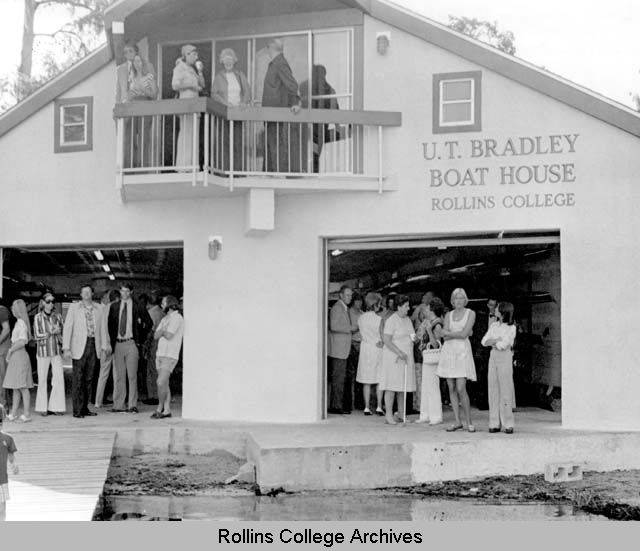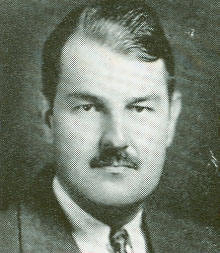Born on December 10, 1900 in Frankfurt, Kentucky to Mary Lawson Hawkins and
William Edward Bradley, Udolpho Theodore Bradley received his early
education in New York and Pennsylvania, respectively. From 1911 to 1915,
Bradley attended the Horace Mann School in New York City, then the Hill
School in Pottstown from 1915 to 1919. Bradley’s early experiences at Camp
Pasquaney (1913 to 1925) in New Hampshire as a camper, councilor, and member
of the crew team demonstrate an early interest in the sport; he later
coached the camp’s team. In 1919 Bradley attended the United States Naval Academy in
Annapolis, Maryland, in which he participated in track, football, and the
plebe crew; he dropped out. In 1921, Bradley began to attend Princeton
University in New Jersey, where he earned a varsity crew letter in 1922,
joined the Varsity and Elm Clubs, and graduated with a bachelor’s degree in
1923. After his graduation, Bradley coached the crew team, taught English,
history, and American history, in addition to assisting in French, Latin,
and mathematics, until 1931. He married Cecile Thibault Robinson on January
12, 1926 and, in the following year, attended summer semesters at Cornell
University in Ithica, New York. Bradley earned his master’s degree at
Cornell, graduating in 1930. From 1931 until 1933, he attended the school
full-time, as he worked on his doctoral degree. Bradley majored in United
States history, minored in European and English history, and received his
doctorate in 1933, after which he joined the Rollins College faculty as a
professor of history and government in the fall.
camp’s team. In 1919 Bradley attended the United States Naval Academy in
Annapolis, Maryland, in which he participated in track, football, and the
plebe crew; he dropped out. In 1921, Bradley began to attend Princeton
University in New Jersey, where he earned a varsity crew letter in 1922,
joined the Varsity and Elm Clubs, and graduated with a bachelor’s degree in
1923. After his graduation, Bradley coached the crew team, taught English,
history, and American history, in addition to assisting in French, Latin,
and mathematics, until 1931. He married Cecile Thibault Robinson on January
12, 1926 and, in the following year, attended summer semesters at Cornell
University in Ithica, New York. Bradley earned his master’s degree at
Cornell, graduating in 1930. From 1931 until 1933, he attended the school
full-time, as he worked on his doctoral degree. Bradley majored in United
States history, minored in European and English history, and received his
doctorate in 1933, after which he joined the Rollins College faculty as a
professor of history and government in the fall.
 Bradley
served as the Rollins crew coach beginning in 1934, becoming one of the
pioneer coaches of crew in the South. He founded the Dad Vail Rowing
Association on February 10, 1939. In addition, he functioned as the
assistant professor of history and government (1933 to 1937), associate
professor of history (1937 to 1942), secretary of the division in human
relations (1938 to 1939), and professor of history (1942). From 1942 until
1945, Bradley took a hiatus from Rollins to serve in the Navy as a
Lieutenant Commander in Puerto Rico during the Second World War, ending his
term of service with a six-month history professorship at Annapolis. In the
December of 1953, he retired from the
United States Naval Reserve (U.N.S.R.) and
returned to Rollins to re-start the crew program. Bradley again coached the
crew team from 1946 until 1965 and, in 1963 brought the Rollins crew to row
in the Henley Regatta in England. He became the faculty-director of rowing
in 1965 until his death on November 25, 1968. Although he taught, students
described him as “kind of like the absent-minded professor. He has his mind
on crew and nothing else seems to enter his field of vision…. He’s a most
dedicated man.”[1]
Bradley earned the Rollins Declaration of Honor from the school in 1949.
In addition to his roles at Rollins, Bradley officiated Intercollegiate
Rowing Association (I.R.A.) regattas at Poughkeepsie, Marietta, and
Syracuse, as well as several Olympic try-outs. He was a member of the All
Saints Episcopal Church. Additionally, he authored the official history of
the Dad Veil Rowing Association: The Dad Veil Story.
In 1965 Bradley received the honor of an induction into the Helms Foundation
Rowing Hall of Fame. Hamilton Holt commended Bradley as a “college
professor, an outstanding coach of winning crews and a good citizen.”[2] Bradley
served as the Rollins crew coach beginning in 1934, becoming one of the
pioneer coaches of crew in the South. He founded the Dad Vail Rowing
Association on February 10, 1939. In addition, he functioned as the
assistant professor of history and government (1933 to 1937), associate
professor of history (1937 to 1942), secretary of the division in human
relations (1938 to 1939), and professor of history (1942). From 1942 until
1945, Bradley took a hiatus from Rollins to serve in the Navy as a
Lieutenant Commander in Puerto Rico during the Second World War, ending his
term of service with a six-month history professorship at Annapolis. In the
December of 1953, he retired from the
United States Naval Reserve (U.N.S.R.) and
returned to Rollins to re-start the crew program. Bradley again coached the
crew team from 1946 until 1965 and, in 1963 brought the Rollins crew to row
in the Henley Regatta in England. He became the faculty-director of rowing
in 1965 until his death on November 25, 1968. Although he taught, students
described him as “kind of like the absent-minded professor. He has his mind
on crew and nothing else seems to enter his field of vision…. He’s a most
dedicated man.”[1]
Bradley earned the Rollins Declaration of Honor from the school in 1949.
In addition to his roles at Rollins, Bradley officiated Intercollegiate
Rowing Association (I.R.A.) regattas at Poughkeepsie, Marietta, and
Syracuse, as well as several Olympic try-outs. He was a member of the All
Saints Episcopal Church. Additionally, he authored the official history of
the Dad Veil Rowing Association: The Dad Veil Story.
In 1965 Bradley received the honor of an induction into the Helms Foundation
Rowing Hall of Fame. Hamilton Holt commended Bradley as a “college
professor, an outstanding coach of winning crews and a good citizen.”[2]
- Angelica Garcia
[1]
Don Ogilvie quoted in Dave Howell, “To England: Rollins College to
Enter Royal Regatta,” Florida Magazine in the Orlando Sentinel,
(June 1963), 9-E.
[2]
Hamilton Holt in the citation for U.T. Bradley’s Decoration of
Honor, 1949, Department of Archives and Special Collections, Box
45E, Olin Library, Rollins College, Winter Park, Florida.
|


